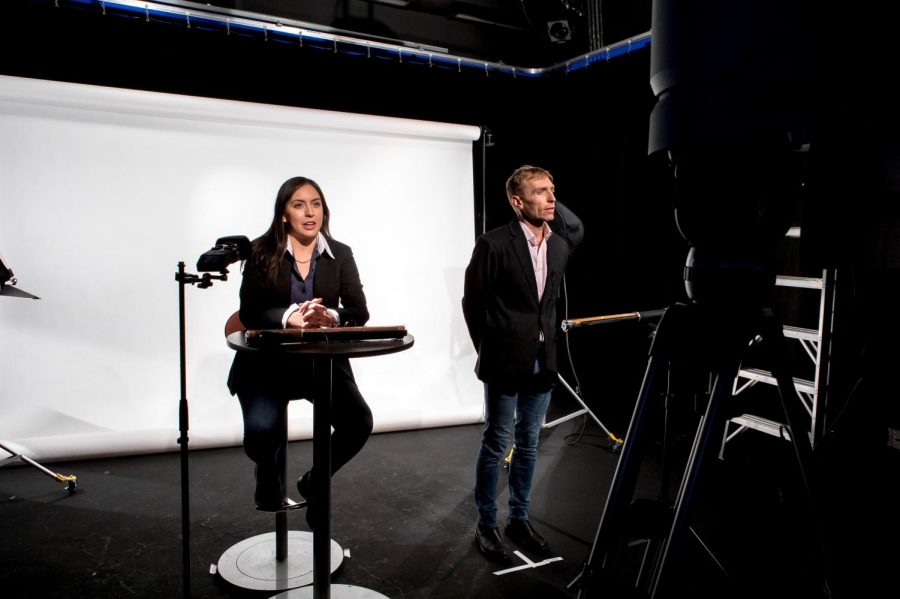Verbatim Performance Lab Interrogates Interview
Courtesy of Verbatim Performance Labs
On Nov. 7 the Verbatim Performance Lab released a mock debate between Matt Lauer and Kellyanne Conway. The lab is famous for then switching the genders of the debaters.
December 1, 2017
Every gesture, every word, every breath.
The actors of the Steinhardt School of Culture, Communication and Human Development Verbatim Performance Lab studied each minute detail of Matt Lauer’s interview with White House Counselor Kellyanne Conway on Feb. 14 about the overnight resignation of National Security Adviser Michael Flynn. The shattering impact of the lab’s reenactment does not stem from what is said; it’s because of who said it.
The composite video, released Nov. 7, explores four versions of the same interview: the first, where Conway is played by a woman and Lauer is played by a man, suddenly morphs into a scenario where Conway is played by a man. Lauer is then replaced with a female actress, and finally, a female Conway faces a female Lauer.
Switching the genders of Lauer and Conway while keeping their gestures and speech patterns the same is meant to get viewers thinking about the questions posed at the beginning of the video, posted on YouTube for anyone to see: “What happens to your perceptions of the interview if a participant’s gender is inverted? What tactics are the participants using? When do the tactics succeed and when do they fail?”
An analysis of these different scenarios holds even more weight in the context of recent reports about Lauer’s inappropriate sexual behavior with colleagues, though these allegations had not yet surfaced at the time the Performance Lab released the video.
The Performance Lab, created by Clinical Associate Professor of Educational Theater Joe Salvatore, is intended as an educational and investigative device. The goal, as described in its mission statement, is to “use verbatim performance techniques as an investigative tool to explore, interrogate, challenge and disrupt preconceived notions, implicit biases and intolerances across a spectrum of political, cultural and social beliefs and experiences.”
Salvatore, who played the male Conway in the video, said that he chose this interview in particular because Conway seemed shaken.
“When Ashley Thaxton, the female Conway, and I first looked at the video together, we said, ‘This woman is under extreme duress,’” Salvatore said. “Given the context of the interview, I became really interested in what it must be like for her to do this job.”
While learning their parts, the actors were also encouraged to try to get to the root of why their subjects did what they did.
“We really focused on why certain movements happened,” Tisch graduate Analisa Gutierrez, the actress playing the female Lauer, said. “Why was there a sudden shift in Matt Lauer’s eyes when he starts talking about this? Is there an insecurity in what he was saying? Why did he stutter on these words? [Andy Wagner, the male Lauer, and I] were constantly discovering nuances.”
Salvatore said that portraying a sense of empathy was a priority in his work.
“How do I develop empathy for people that I disagree with?” Salvatore said. “I want other people to have that experience when they watch the clips.”
According to Salvatore and Gutierrez, all of the feedback so far from friends, family and students, like Steinhardt freshman Sasha Pak, has been positive.
“I really like how they used both male and female actors to see what difference it makes,” Pak said. “I definitely think there would be less backlash against [Kellyanne Conway] if she were a male, even if all of the words and attitudes were the same.”
Verbatim Performance Labs intends to continue to create educational and investigative videos, aiming for five more by the end of the academic year.
“I don’t want to speak in specifics about what we’re working on [next] because I want it to kind of be a surprise,” Salvatore said. “We’re not leaning towards a gender-flip on this. We can flip gender, race, ethnicity or age, but also being performed by another person’s voice or body changes the way we perceive the messages.”
Email Amelia McBain at [email protected].





























































































































































